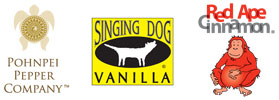
Pepper and Politics in Pohnpei, FSM
The remarkable flavor of Pohnpei Pepper, sometimes called Ponape Pepper, had been absent from the culinary world for about 5 years. Long considered the most flavorful of peppercorns, its fruity yet spicy flavor was sorely missed when it slowly disappeared from the shelves of fine foods retailers and began being listed as “out of stock” on food distributor order sheets. Often a regionally isolated spice can become scarce for a couple of years due to natural disasters such as the hurricanes that rocked vanilla prices a couple of years ago. The disappearance of Pohnpei pepper, however, was the result of a political storm.
Here is the story:
In response to complaints to the Pohnpei government by pepper farmers that the pepper traders were not purchasing all of their pepper, the state of Pohnpei, using money appropriated for that purpose by the legislature, established a pepper processing facility in Pohnpei that began operating in 1995. To supply raw pepper for the facility, it used Pohnpei state funds to buy pepper from Pohnpei pepper farmers. It began purchasing pepper in mid 1995.
The state of Pohnpei began to pay the pepper farmers nearly 10% more than the pepper trading firms were. The state of Pohnpei purchased all of the pepper offered to it, including immature berries, stems and leaves. The pepper brokers and millers were unable to compete with the prices being paid by the state and still make a profit in the world market. They went out of business. The reduced quality of the peppercorn was not acceptable to the international buyers. Pohnpei’s pepper processing facility ultimately failed and along with it brought the collapse of the Pohnpei pepper growing industry.
In early 2004, Kestrel Growth Brands, Inc. owners Bill Wiedmann and Marty Parisien were in Micronesia working on other agricultural projects when they first heard about the now, very rare, Pohnpei pepper. They were introduced to the only farmer that had begun growing pepper again on a small commercial scale and were pleased to discover that the farm was completely organic and employed innovative and sustainable farming practices.
The farmer asked Marty and Bill to consider importing the pepper into North America.
Having never heard of Pohnpei pepper, Wiedmann and Parisien promised to explore the possibilities for importing into the USA. After a few phone calls to a couple top chefs and specialty food stores it was clear that they should bring it in. “I called and asked the Executive Chef or the retail buyer if they had ever heard of Pohnpei pepper”, says Parisien “and they would respond with ‘Do you have some? How can I get it?!’ We knew after about four calls that we needed to import the pepper.”
Marty worked out a Fair Trade Plus+™ agreement with the farmer whereby the farmer participates in the final sale of the pepper under the brand Pohnpei Pepper Company™, while Bill went to work on the web site, pohnpeipepper.com. Due to the high cost of the organic farming coupled with the low volume harvested, the price of Pohnpei Pepper is admittedly quite high, but the robust, yet fruity, flavor of Pohnpei Pepper is a little extravagance that it is well worth it.
